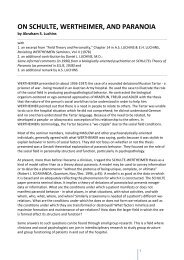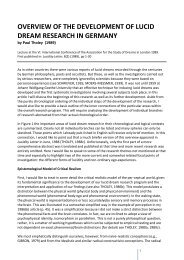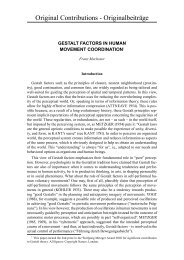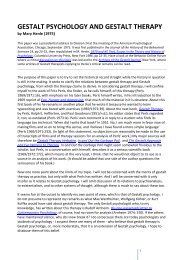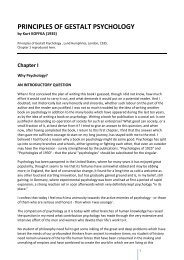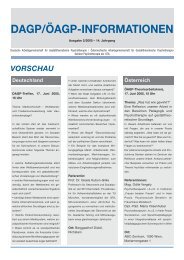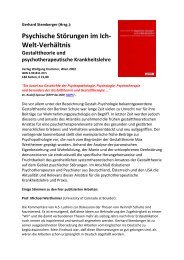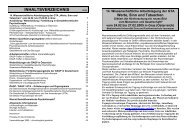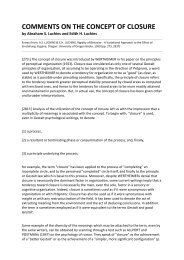pdf-Download - Society for Gestalt Theory and its Applications (GTA)
pdf-Download - Society for Gestalt Theory and its Applications (GTA)
pdf-Download - Society for Gestalt Theory and its Applications (GTA)
You also want an ePaper? Increase the reach of your titles
YUMPU automatically turns print PDFs into web optimized ePapers that Google loves.
there. Years later, <strong>for</strong> medical treatment Richard GRELLING returned to Berlin, where he had been<br />
born on 11 June 1853 <strong>and</strong> where he died on 15 January 1929. [An erroneous claim that he had<br />
died in Italy had been made in an earlier obituary that was referred to in the 1929 Berlin obituary,<br />
according to our correspondence with Volker PECKHAUS.]<br />
In 1912 Kurt GRELLING had married Malvine HAASS (1884-1954). The couple had no children of<br />
their own but adopted a daughter, Eva Maria RUMPF. GRELLING returned to Göttingen in 1913 but<br />
did not apply <strong>for</strong> habilitation, because of an in<strong>for</strong>mal numerus clausus <strong>for</strong> Privatdozenten<br />
(in<strong>for</strong>mal restriction on the number of private lecturers) in philosophy. He was conscripted <strong>for</strong><br />
military service in World War I in late 1915 or early 1916 <strong>and</strong> served as a "Sanitätsoffizier" (Army<br />
medic). After the war, GRELLING again attempted to be habilitated at Göttingen but failed. To<br />
make a living, he became a Gymnasium (secondary school) teacher of philosophy, mathematics,<br />
<strong>and</strong> physics. This position allowed him to use his pedagogical skills <strong>and</strong> probably gave him the title<br />
of professor but did not satisfy his yearning <strong>for</strong> a university career. After service in several<br />
secondary schools, he became a trade union archivist in Berlin. In 1920 he responded to a<br />
questionnaire <strong>for</strong> members of the International Youth Union. To the question about special skills<br />
he answered [in German]: "Grasping of complicated logical connections, good memory, skill <strong>for</strong><br />
teaching." To a question about the motives <strong>for</strong> choosing his present job he wrote, "Should actually<br />
have become a university teacher." About this time, he resumed teaching in Gymnasiums, as<br />
Studienrat in 1923 <strong>and</strong> later as Oberlehrer.<br />
After twelve years of marriage, Kurt <strong>and</strong> Malvine were divorced in 1924. A year later Kurt married<br />
Margarethe (or Margareta) Alma BERGER, usually called Greta, who worked <strong>for</strong> a trade union.<br />
They had two children: Karin, born on 31 August 1927, <strong>and</strong> now married to Hans GIMPLE <strong>and</strong><br />
living in Zürich, <strong>and</strong> Claude (Klaus-Peter), born on 2 June 1930, <strong>and</strong> now married to Audrey GAHL<br />
<strong>and</strong> living in Minnesota. The GRELLINGS saved their children by sending them in 1939 to a private<br />
boarding school in Switzerl<strong>and</strong>. [Claude GRELLING wrote that he was quite sure that his parents<br />
sent his sister <strong>and</strong> him to this school to have them learn French <strong>and</strong> to get them out of Germany.<br />
He e-mailed: "The name of the boarding school my sister <strong>and</strong> I attended from 1939 to 1942 was<br />
simply 'Les Rayons'. It was located in the small village of Gl<strong>and</strong>, near Nyon, about half way<br />
between Lausanne <strong>and</strong> Geneva on the northern (Swiss) shore of Lake Geneva. It was attended<br />
mostly by children of German parentage, with a few British children in the student body. I believe<br />
the school closed <strong>its</strong> doors during or shortly after WW II".]<br />
Kurt GRELLINGs mother died in 1934, leaving him a sizable estate to manage. The inheritance<br />
allowed the com<strong>for</strong>table living Claude remembers from his childhood.<br />
GRELLING, the Berlin Group, <strong>and</strong> REICHENBACH<br />
After his return from Göttingen to Berlin in about 1920, GRELLING became an active member of<br />
the so-called Berlin Group or Berlin <strong>Society</strong> <strong>for</strong> Empirical Philosophy, Gesellschaft für empirische<br />
Philosophie.[8] Later Hans REICHENBACH became <strong>its</strong> leading member.[9] He had been teaching at<br />
the Technical University (Technische Hochschule) in Stuttgart when, after much controversy, he<br />
was invited to Berlin University in 1926.[9a] The controversy arose in part from the objections by<br />
some professors to REICHENBACHs empiricism; they claimed that his philosophy of science was<br />
not philosophy. There was also some concern about his never having studied Latin, about his<br />
having belonged to a student group linked with socialism, <strong>and</strong> possibly about his Jewish<br />
background. But other professors, including Albert EINSTEIN <strong>and</strong> David HILBERT, supported the<br />
nomination <strong>and</strong> they prevailed. REICHENBACH stayed in Berlin only about seven years. He was<br />
7



